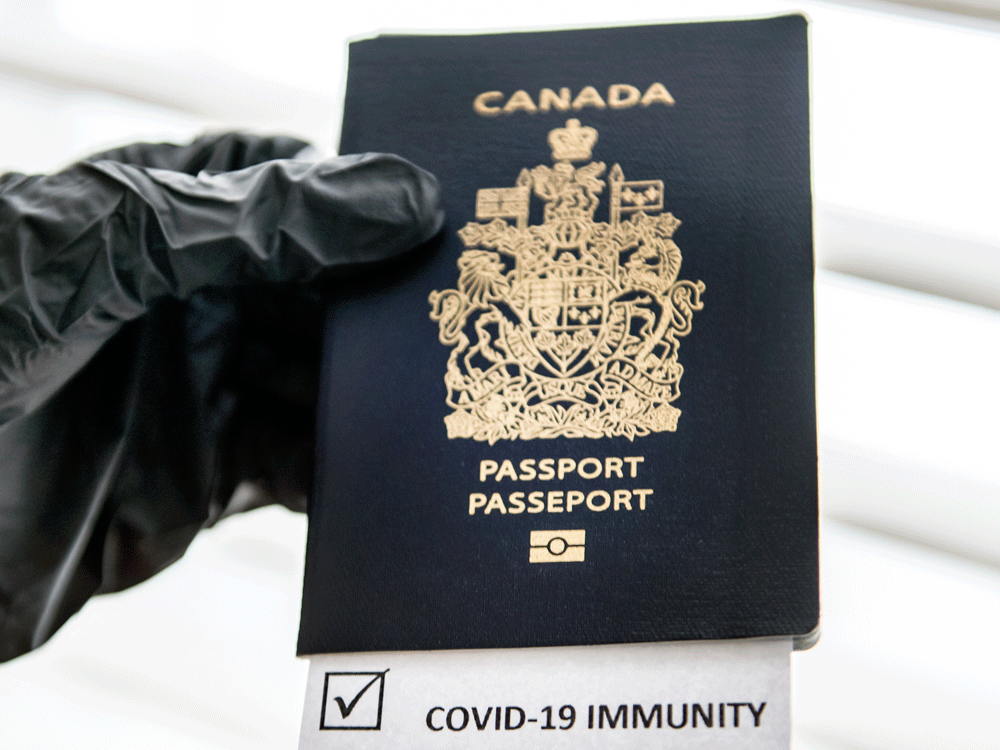Vaccination certificates, immunity passes, green passes, health passes — the case for and against can be as polarizing as lockdowns
Like the shoeless and shirtless, the unvaccinated could soon find themselves being denied service at some establishments across Canada.
Vaccination certificates, immunity passes, green passes, health passes — the case for and against can be as polarizing as lockdowns.
From the pandemic’s outset, some have warned COVID-19 immunity or
vaccination certificates would lead to a two-tier society, where
some get to live normal lives and others don’t. “Passport, please,” raises privacy considerations and questions over data ownership. Others argue concerns over privacy and liberty rights are being overplayed.
Domestic vaccine passports up to provinces Trudeau...
Video
Prime Minister Justin
Trudeau indicated Tuesday he has no plans for a national domestic vaccine passport program and would leave any such system up to the provinces. But while provinces grapple with whether or not to afford more freedom to the fully vaccinated, some private businesses are making up their own rules.
Quebec was the first province to dip its toes into
a domestic COVID-19 vaccine passport scheme,
announcing last week that it would permit the “fully protected” access to gyms, bars, restaurants, festivals, sporting events and other non-essential services and activities in the event of a fourth wave or fall surge in cases.
Due to take effect Sept. 1, the program would be mandated in
COVID hot zones only and won’t apply to essential services. The “fully protected”
would include those who have already been infected with COVID.
In Manitoba, digital and physical immunization cards for the fully vaxxed enable holders to skip self-isolation after inter-provincial travel. The fully vaccinated (two weeks from the time of their second dose)
can also dine indoors at restaurants and bars with other fully vaxxed friends and family from outside their household. Restaurant operators can use an app to scan immunization cards, which show only the person’s name and a QR code confirming he or she is fully vaccinated.
“There are discrimination concerns, there are equality concerns and
fundamentally it undermines the idea that (vaccination) is a choice that people make for themselves,” said lawyer Cara Zwibel, of the Canadian Civil Liberties Association.
Throughout the pandemic, governments and public health authorities have based decisions on the population as a whole, she said. “We could have done things differently right from the outset.
We might have said everyone over 65 has to stay home, and the rest of you can go on and live your lives. Because at least at the very beginning — I know now variants have changed things — at least at the very beginning it was really those people that were most seriously at risk from COVID. But we didn’t do that,” Zwibel said.
Montrealers react to Quebec's proposed vaccine passport system
Video
Governments saw the pandemic as a population issue, “and we closed and opened things based on how the population was doing,” she said.
“So I don’t think now we’re justified in saying,
‘Well, if you’ve been vaccinated, you get access to X, Y and Z and if you haven’t, then you don’t get access to those things.’”
There is obviously no constitutional right to go to a restaurant, she said.
“I wouldn’t bring it to that level. But, socially, I think it’s a dangerous idea.”
In the absence of government guidelines, can private businesses just go it alone? That depends, Zwibel said.
Generally, a private business doesn’t have to serve you. “They can refuse service, as long as they don’t refuse service based on a
prohibited ground of discrimination under our human rights laws,” for example, such as religion or creed.
But businesses have to think about what they’re taking on, in terms of privacy and the obligations to maintain the personal health information they’re provided with, Zwibel said.
“I think the answer is, they can (make up their own rules). Our answer would probably be, we hope they don’t, and we don’t think they should,” Zwibel said.
The activities being targeted by Quebec’s
vaccination passports aren’t essential services, but any intrusion on fundamental rights, like the right to privacy, integrity and freedom, should be minimal, said Yann Joly, research director of the Centre of Genomics and Policy at Montreal’s McGill University.
For example, it could be argued that denying the unvaccinated entry to gyms is not such a big intrusion.
“The fact that you’re not allowed at your local gym doesn’t prevent you from just running outdoors, or (exercising) at home,” Joly said. “That’s less important, less intrusive than not being allowed to work, or
prevented from going into some public services establishment, like to renew your driver’s license. That would be a much bigger problem.”
Gyms are reopening in Ontario Friday at 50 percent capacity, but
Goodlife Fitness, one of the country’s largest fitness chains, tweeted that it will not “request or disclose information regarding individual vaccination status.” The company said on its website that while it “strongly encourages everyone to get vaccinated” once eligible, and that it will continue to follow all public health guidelines set out for fitness facilities, “Currently, those requirements do not require proof of vaccination to enter our locations.”
Businesses wishing to collect proof of vaccination must have a reasonable purpose for doing so, according to the office of Alberta’s information and privacy commissioner. Accommodations must be made for people who cannot be vaccinated for health reasons and any
passport system should be based on evidence, Joly said: I
s it the best solution to prevent a fourth wave, or to stop one? The process itself has to be rigorous, he added, so there are no breeches of confidential information, “
no way that the list of people that have not been vaccinated becomes available to a broad circle of the population.”
Quebec would likely rely on QR codes the province issues upon full vaccination.
“When you scan all that information, where is it going to go,” Joly asked. “Are you going to delete it?” (Alberta’s privacy commissioner has said proof of vaccination information should be securely destroyed “once its business purpose has been achieved.”)
“And what do you do when the scan shows somebody has not been vaccinated twice,” Joly said. “How can you notify them they can’t enter this or that activity, without other people noticing, without signalling them out?
These are the kinds of questions that they should be able to answer in order for the process to be resistant to any challenge.”
Quebec’s passports won’t make vaccination a condition of employment. A person’s vaccine status will be neither a cause for dismissal nor a bar to their being hired, Quebec Labour Minister Jean Boulet said last week. T
he system would only be implemented once the entire population, aged 12 and over, has had the opportunity to get doubly dosed.
“Of course, there is a positive point,
the fact that our restaurants will stay open should COVID cases increase by far in the fall, in September,” said Bourbeau, of Restaurants Canada. “Our priority is to reopen our restaurants and to keep them open for good.
Because every time that a government closes non-essential businesses, our workers start finding jobs in a different industry.”
But Quebec needs to clarify exactly how the program would be implemented, Bourbeau said.
“We will be the ones that will be asked to verify if people have their passport and their two doses.”
Quebec isn’t alone. After pledging that vaccine passports would never “divide” the French people, French president Emmanuel Macron this week announced t
hat proof of vaccination, recovery from COVID or a negative PCR test will be necessary for entry into bars, restaurants, cafes and shopping centres as of August. Greece has also unveiled a similar program.
Canada’s privacy guardians have cautioned that privacy “must be front and centre” as governments and businesses mull proof of vaccination. But fully vaccinated people have a dramatically decreased risk of infection and likely have a decreased risk of spreading the infection to others,
an expert panel on COVID convened by Canada’s chief science advisor reported in the spring.
How long immunity lasts remains an open question, any passport scheme must
ensure authenticity and minimize fraud and, if vaccination certificates become more common,
groups or communities that have suffered historic biases and profiling must not face increased scrutiny, the panel said.
Thank you Momotchi on Telegram, a doctor had the D-dimere test carried out to find out if there are blood clots invisible to the scanner, 62% of the vaccinated had these micro clots, all the more reason to stand firm in the face of vaccine injunctions, in 8 months, we will have won .






